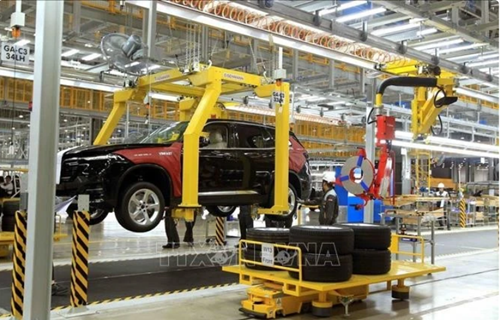According to National Assembly deputy and economist Phan Duc Hieu, the introduction of Resolution No.68-NQ/TW, if effectively implemented, could represent the third breakthrough in the evolution of Vietnam’s private sector.
He explained the first breakthrough was the formal recognition of the private sector, and the second was the empowerment of private enterprises through administrative reforms, mostly in market entry procedures.
    |
 |
|
Car production at the VinFast factory, part of the privately-owned Vingroup conglomerate, in Cat Hai, Hai Phong |
The latest resolution, Hieu noted, marks a qualitative shift by aiming to remove bureaucratic obstacles to private business operations, prevent the criminalization when settling responsibilities of private companies, and improve the sector’s access to essential resources such as land, finance, premises and human capital.
From a business perspective, Tu Tien Phat, CEO of the Asia Commercial Joint Stock Bank (ACB), stressed the need to ensure appropriate capital sources and digital payment systems that are convenient and reliable, thereby empowering firms to operate with greater confidence and efficiency.
Speaking from a regulatory viewpoint, Bui Thu Thuy, Deputy Director of the Ministry of Finance’s Department of Private Business and Collective Economic Development, noted that Resolution 68 stands out as a landmark policy with far greater transformative potential than its predecessors, particularly in the area of business conditions. It stipulates that all business requirements must be publicly disclosed, ending the practice of ministries and sectors independently introducing additional conditions, with only a few exceptions permitted in sectors related to national defense, security, and public health.
The resolution also explicitly stressed equal treatment of all economic sectors in terms of business opportunities and access to resources, she added.
Thuy elaborated on why the Politburo has underlined the importance of fostering rapid, sustainable, and efficient development of the private economic sector, framing it as both an urgent task and a long-term strategic priority.
According to the official, at present, foreign-invested enterprises (FDI) and state-owned enterprises (SOEs) each contribute just over 20% of the national GDP. In contrast, the domestic private sector accounts for more than 50%. With the nation’s ambitious target of achieving 8% GDP growth in 2025 and even double-digit growth in the future, the private sector’s role is undeniably critical.
Source: VNA